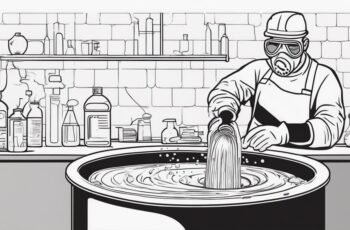You might think that septic odors are just an inevitable part of having a septic system, but with the right maintenance, you can keep foul smells at bay.
By following these 7 best tips, you can ensure that your septic system functions smoothly and odor-free.
From establishing a regular pumping schedule to implementing effective odor elimination techniques, each step plays a vital role in maintaining a fresh-smelling environment around your home.
So, let's explore how these simple practices can make a significant difference in your septic system's odor control.
Key Takeaways
- Use septic-safe products and maintain beneficial bacteria balance for odor prevention.
- Ensure proper ventilation and clear vent pipes to prevent gas buildup and odors.
- Direct rainwater away from the drain field and maintain a grass cover for system protection.
- Regularly add odor control products and conduct inspections to prevent septic odors.
Regular Pumping Schedule
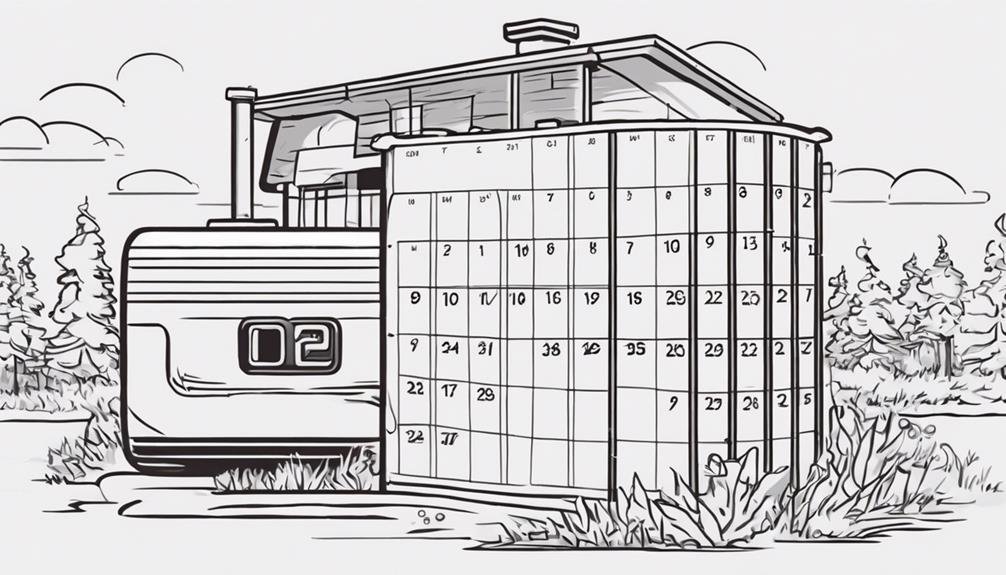
Have you scheduled your septic tank for regular pumping to prevent odors and maintain its efficiency? Pumping frequency plays a crucial role in ensuring the longevity and proper functioning of your septic system. It's recommended to have your septic tank pumped every 3 to 5 years, depending on factors such as household size, water usage, and the volume of solids accumulated in the tank. Neglecting this essential maintenance task can lead to unpleasant odors, backups, and potential system failures.
Regular pumping not only prevents odors but also promotes proper tank maintenance. Over time, solid waste builds up in the tank, reducing its capacity to treat wastewater effectively. By adhering to a routine pumping schedule, you can eliminate the accumulation of sludge and scum, allowing the system to operate efficiently. This maintenance practice is fundamental in preventing costly repairs and ensuring the overall health of your septic system. Remember, a well-maintained septic tank is key to a trouble-free and odorless system.
Proper Waste Disposal Practices
To maintain a septic system free of odors and functioning efficiently, proper waste disposal practices are crucial for ensuring the longevity and optimal performance of your system. Implementing eco-friendly disposal methods and considering alternative waste management solutions like composting toilets can significantly reduce the strain on your septic system and minimize the risk of foul odors.
Here are three key waste disposal practices to help you maintain a healthy septic system:
- Eco-Friendly Disposal: Opt for biodegradable products and chemicals to reduce the impact on your septic system and the environment. Avoid flushing harmful substances like grease, oil, or harsh chemicals down the drain, as they can disrupt the natural balance of bacteria in the septic tank.
- Composting Toilets: Consider installing a composting toilet as an eco-conscious alternative to traditional septic systems. Composting toilets break down waste into nutrient-rich compost, reducing water usage and the strain on your septic system.
- Proper Solid Waste Disposal: Dispose of solid waste, such as diapers, sanitary products, and paper towels, in the trash rather than flushing them down the toilet. Solid waste can clog pipes and hinder the septic system's performance, leading to unpleasant odors and potential backups.
Use Septic-Safe Products
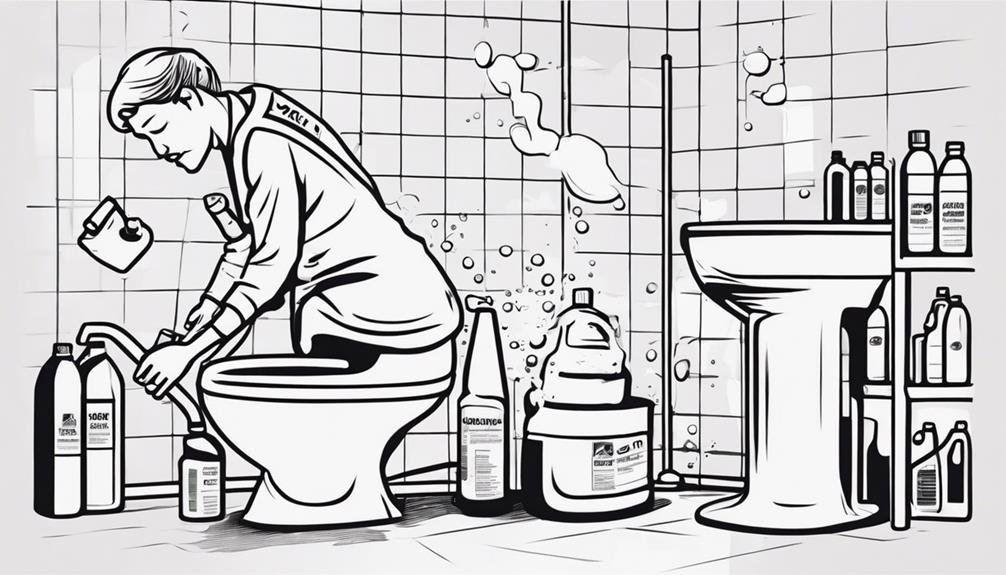
Using septic-safe products is essential for maintaining the health and efficiency of your septic system. Opting for eco-friendly alternatives and septic-friendly options can significantly reduce the risk of harmful chemicals entering your septic tank and disrupting the natural balance of bacteria responsible for breaking down waste.
When choosing cleaning products, look for natural remedies and organic solutions that are free from harsh chemicals like bleach, ammonia, and phosphates. These substances can harm the beneficial bacteria in your septic system, leading to clogs and odors.
Additionally, consider using septic-safe toilet paper, as thick or non-biodegradable options can cause blockages in your system. By selecting products that are gentle on your septic system, you not only prevent odors but also contribute to its longevity and proper functioning.
Maintain Drainage Field
To maintain your drainage field effectively, it's crucial to conduct regular inspections to ensure proper functioning.
Additionally, controlling vegetation around the drainage field can prevent root intrusion and maintain optimal absorption rates.
Regular Inspections
Regularly inspecting your drainage field is crucial for preventing septic odors and maintaining the overall functionality of your septic system. Here are three essential steps to ensure your drainage system stays in optimal condition:
- Check for Standing Water: Inspect your drainage field regularly for any pooling or standing water, as this could indicate a blockage or a failing drainage system.
- Monitor Vegetation: Keep an eye on the vegetation in and around the drainage field. Overgrown roots can damage pipes and hinder proper drainage.
- Look for Foul Odors: If you notice any foul odors around the drainage field, it could be a sign of a septic issue that needs immediate attention.
Proper Vegetation Control
Inspecting and controlling vegetation in your drainage field is essential for maintaining optimal septic system functionality and preventing odors. Proper plant selection is crucial to prevent root intrusion into the drainage pipes. Choose grasses or shallow-rooted plants over deep-rooted ones.
Regularly mow the grass to an appropriate height, usually between 2.5 to 3 inches, to discourage weed growth and allow air to circulate properly. Avoid planting trees or shrubs near the drain field to prevent root damage.
Implement landscaping tips such as directing water from downspouts away from the drainage field to avoid oversaturation. Additionally, refrain from parking heavy vehicles or placing structures on the drain field to prevent soil compaction.
Inspect for Leaks and Damage
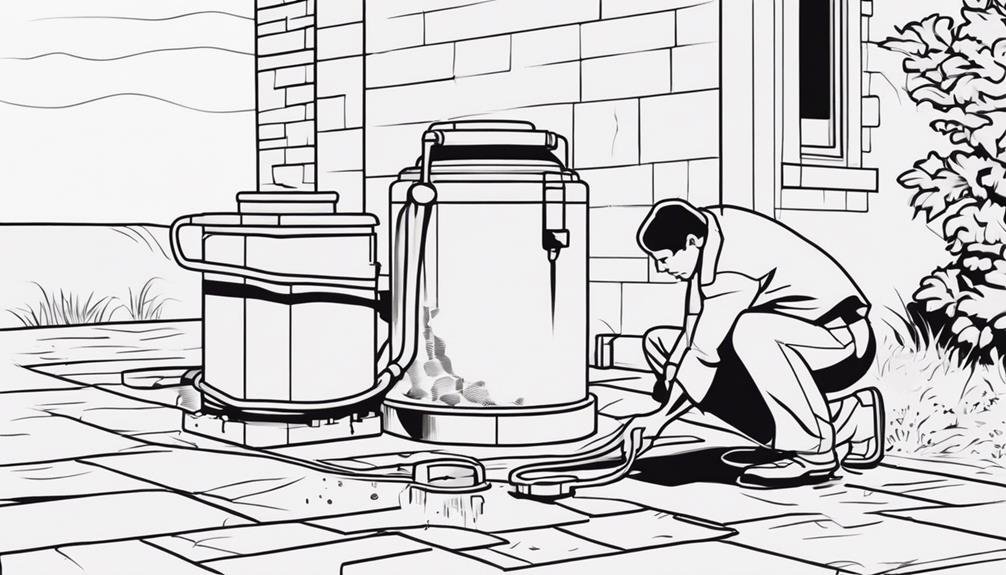
Inspect your septic system for leaks and damage regularly to ensure optimal performance. Check all pipes, connections, and components for any signs of wear or deterioration.
Repair any issues promptly to prevent septic odors and costly damages in the future.
Check Pipes Regularly
Keeping a watchful eye on your pipes for leaks and damage is crucial in maintaining a healthy septic system. Regular pipe inspection helps prevent unpleasant odors and ensures the proper functioning of your septic system.
Here are three essential tips to help you maintain your pipes effectively:
- Check for Leaks: Look for any signs of water leakage around your pipes, joints, and connections. Even small leaks can lead to significant issues if left unattended.
- Inspect Pipe Integrity: Regularly examine the pipes for any cracks, corrosion, or damage. Addressing these problems promptly can prevent costly repairs in the future.
- Monitor Pipe Stability: Ensure that the pipes are securely in place and not sagging or misaligned. Proper pipe alignment is crucial for the efficient flow of wastewater and to prevent blockages.
Repair Issues Promptly
To maintain a healthy septic system and prevent unpleasant odors, promptly address any leaks or damage found during your regular pipe inspections. Leak detection is crucial in preventing septic odors from permeating your home.
Inspect all pipes, joints, and connections for any signs of leakage such as water puddles, damp areas, or foul smells. Addressing leaks promptly not only prevents odors but also avoids potential water damage to your property.
Additionally, damage to pipes can lead to leaks, causing odors to escape from the septic system. By promptly repairing any damage found during inspections, you ensure that your septic system functions properly, minimizing the risk of odors inside and outside your home.
Control Excessive Water Usage
To avoid overloading your septic system and prevent foul odors, be mindful of how much water you use on a daily basis. Excessive water usage can strain your septic system, leading to potential backups and unpleasant smells.
Here are three practical tips to help you control water usage and maintain a healthy septic system:
- Fix Leaks Promptly: Check for and repair any leaks in faucets, toilets, or pipes. Even small leaks can add up to significant water waste over time, overburdening your septic system unnecessarily.
- Install Water-Efficient Fixtures: Upgrade to water-efficient toilets, faucets, and showerheads to reduce water consumption. These fixtures can help lower your overall water usage, benefiting both your septic system and the environment.
- Spread Out Water Usage: Avoid overloading the system by spreading out laundry loads, showers, and dishwashing throughout the week. This practice prevents a sudden surge of water entering the system, allowing it to function more effectively.
Implement Odor Elimination Techniques
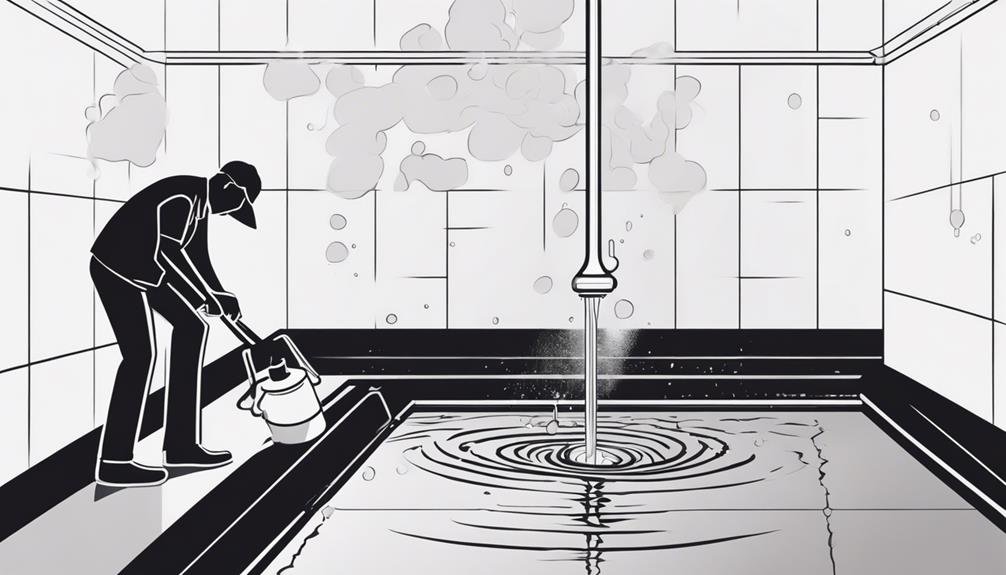
Implementing effective odor elimination techniques is crucial for maintaining a pleasant environment and ensuring the optimal functioning of your septic system. To combat septic odors, consider using odor neutralizing solutions. These solutions contain enzymes and bacteria that break down organic matter, reducing the production of foul-smelling gases in your septic tank. Regularly adding these solutions can help control odors and promote a healthier septic system.
Another important aspect to address is ventilation improvement. Proper ventilation is essential for preventing the buildup of noxious gases that can lead to unpleasant odors. Make sure that your septic system's vent pipes are clear of any obstructions and are functioning correctly. Additionally, enhancing the airflow around your septic tank and drain field can aid in dissipating odors more effectively.
Conclusion
To keep septic odors at bay, remember to stick to a regular pumping schedule, dispose of waste properly, use septic-safe products, maintain your drainage field, inspect for leaks, and control water usage.
By implementing these maintenance tips, you can prevent unpleasant odors and ensure your septic system functions properly. Stay proactive and diligent in your septic system maintenance to avoid any potential issues in the future.

